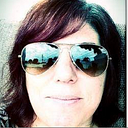Passing Down Panic
“I’m afraid of everything.”
My son was not a child when he said this to me. He was 23, it was just last week, and it hit me in my soul.
The early signs of anxiety were there — the separation anxiety that had him crying every single day of pre-school, his dependence on “Lucy,” a soft, pink doll he clutched from babyhood until he was at least four. He would melt down if Lucy wasn’t nearby at all times and I soon realized its presence soothed him when he felt the world around him was lining up in the straight lines he preferred. He was fearful of meeting new people, being put in new situations, he freaked out when his routine veered from the norm.
But he was bubbly and friendly and adorable, and I noted the quirks in his personality as just that, quirks. He became less bubbly as time went on and for most of his pre-teen and teen years was downright subdued, and spent a good portion of his out of school time alone in his room, playing his guitar. He had friends who frequently called on him to hang out and to the mischievous things young kids did together, but he preferred the company of himself. Having friends over seemed to exhaust him. Even when he did on occasion go out with his friends, he came home early and cranky.
I should have seen it. I should have put two and two together. I should have known.
Many years ago, I was officially diagnosed with General Anxiety Disorder. It’s something I’ve dealt with most of my life, but finally decided to seek help for well into adulthood. I had gotten to the point where it was unmanageable and I knew I needed medication to get myself on track, mentally.
So how did I not put together what my son was going through? How did it take me until he was a young adult to recognize that he, too, suffered from GAD, that he needed help and medication?
The cold truth is maybe I did recognize it, but pushed it away because the guilt of passing down my mental illness to my son was too great to bear. I attributed his symptoms to other things going on his life: my divorce when he was young, moving out when he was older.
“I’m afraid of everything.”
He’d been diagnosed at this point, tried various medications but didn’t connect with any of them, and now felt like he was floundering through life. I thought he’d gotten better. He’d been going to concerts, hanging out with friends, made an attempt at a second job.
I know this phrase well, I know what it’s like to be afraid of everything. I know what it’s like to have a constant surge of anxiety running through your body. I know what it’s like to be afraid to walk into a room, get on a train, make eye contact with someone, be social for more than an hour. I know. I know how it is to fear driving, shopping, doing anything that involves leaving home. You do it because you have to, but it’s a struggle and it’s physically and mentally exhausting.
I could see this on him now. He was wearing his anxiety like an ill-fitting coat, there for all to see. And it devastated me.
“I’m sorry,” is what I said, and while it might have come off as the same kind of “sorry” you utter at the funeral of someone you barely knew, what I meant was “I’m sorry I gave this to you. I’m sorry you inherited this. I’m sorry, this is all my fault.”
To see your own demons grabbing at your child is a remarkable thing. Your first thought is to claw them off of him, fight the demons for him, but you can’t, because they’ve staked their claim. They’re now his, and he has to learn to fight them himself. The anguish you feel of having set loose the demons on him is an unforgiving pain. I gave him this life. I gave him these monsters.
I gave my son a lot of things; his wavy hair, his brown eyes, his love for hockey and baseball and music that makes you want to fold into yourself and cry. I gave him a penchant for pizza and a thing for horror movies and the ability to recall trivial facts no one cares about. And I gave him this, an anxiety disorder. It keeps me awake at night. What if. What would his life be like, have been like, if I didn’t hurl bad genetics at him. What if he didn’t spend most of his time wracked with emotional pain, fighting off an onslaught of worry. What if.
“I’m sorry.”
There’s nothing I can do. I can’t change this. I can’t make it go away, and isn’t that the only thing a parent wants to do when their kid is hurting, make it go away? Now imagine if that hurt came — even inadvertently — from you. It’s a guilt I’m still learning to live with.
I don’t know how to make him less afraid. I don’t have a cure for him. What I do have is years of experience and the name of a good doctor. I can help him navigate the rocky waters of anxiety, I can be here for him when his worries overwhelm him, when his fears take over his mind. I can hope that there is a medication that he will settle in with, one that will sort the chemicals in his brain and provide what he is missing.
“I’m afraid of everything.”
So am I, son. So am I.
